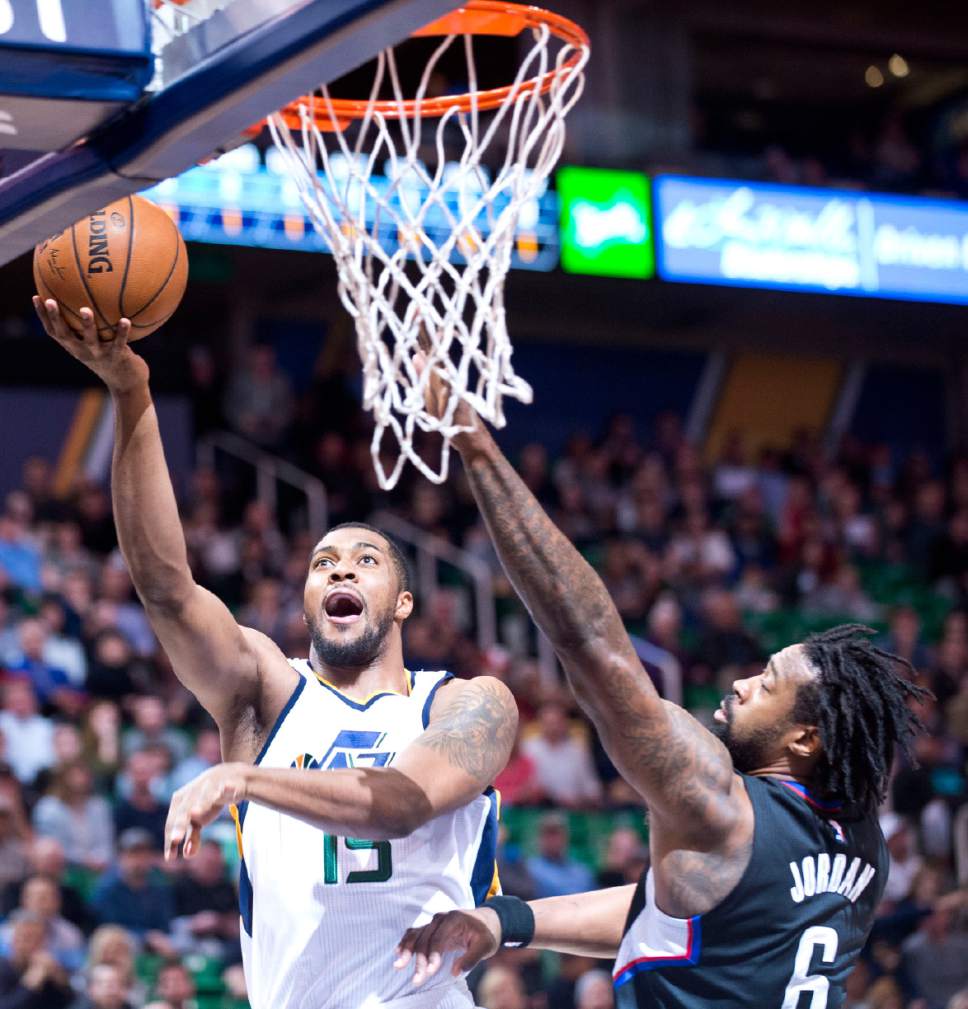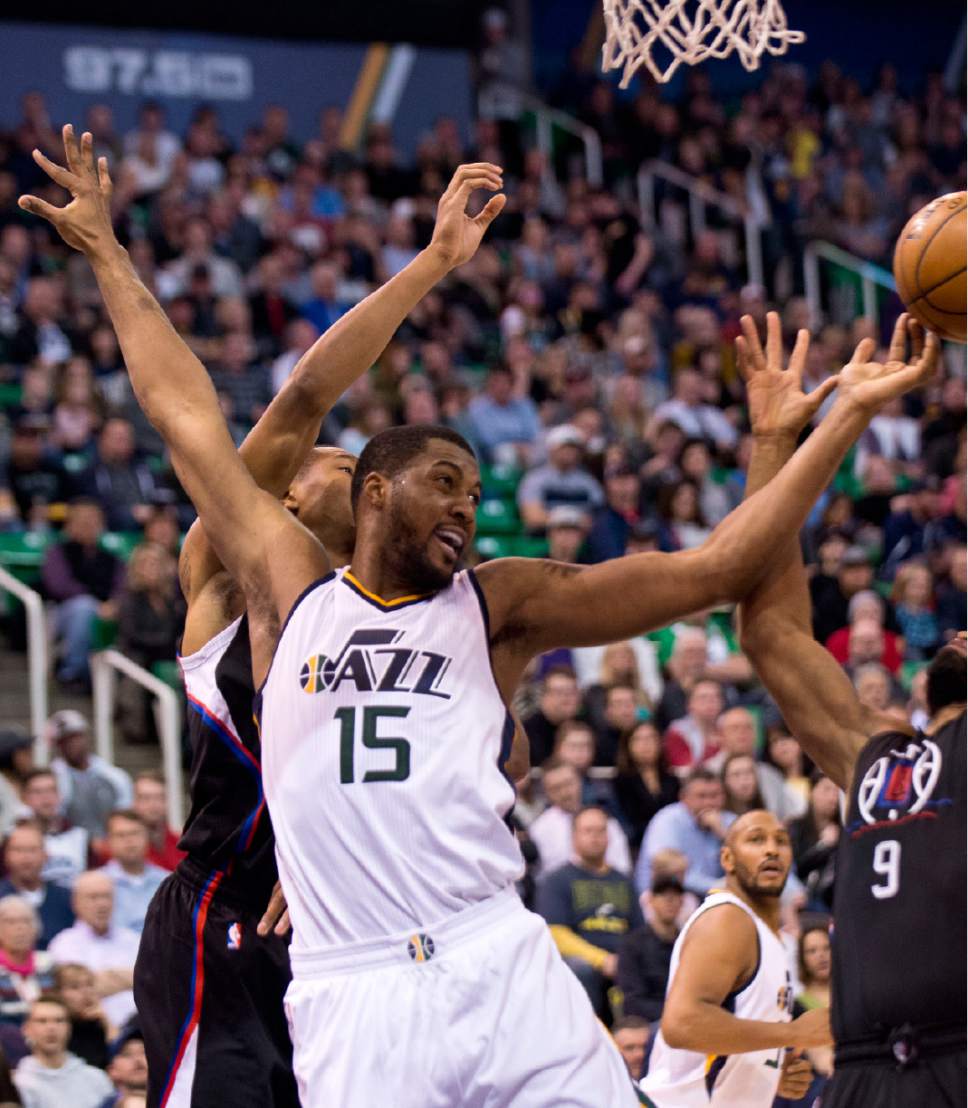This is an archived article that was published on sltrib.com in 2017, and information in the article may be outdated. It is provided only for personal research purposes and may not be reprinted.
Derrick Favors paused, but not for long, as he considered the answer to a question that was posed to him shortly after he arrived in Salt Lake City, as the other end of a trade that sent Deron Williams packing: Can you be a 20-and-10 guy for the Utah Jazz?
The young power forward, a No. 3 pick in the NBA Draft, looked up and said: "I can be that if that's what the Jazz want me to be."
That's exactly what the Jazz wanted him to be.
And it seemed, back then, as though that might be within his reach. Favors had the body for it. He had, at least in embryonic form, the talent for it. Nobody was sure whether he had the fire and drive for it. He was kind of laid-back and soft-spoken, not overly demonstrative. He was almost bashful. But the vibe was there, the measurables were there, the emphasis on defense was there, as were the hints and glimpses of something promising, something big.
Bit by bit, as the seasons passed, the progression was there, too. He rebounded, he blocked shots, and to a point he developed his offensive game. And there were the subsequent reasonable arguments arising over just who was more important to the Jazz's future … Gordon Hayward or Favors.
Either way, Favors was an emerging force. His contract was extended, for a span that brought him security but also was for an amount south of market value. That deal runs out next season, when he will become a free agent. And that's likely what he'll do: test the market. From there, who knows?
Nobody knows.
There was a time, then, when Favors was seen as one of the pillars upon which the Jazz were building their future. This is not that time.
He's morphed from darn near indispensable to punctuation that looks like a hook with a period under it. Tuesday's deadline for an early contract extension, as reported earlier by The Salt Lake Tribune, will pass without a new deal for Favors.
Compare that with the deep negotiations that went on between the Jazz and point guard George Hill early Tuesday morning, talks that, in the end, were not consummated, but that were obviously prioritized by general manager Dennis Lindsey. The Jazz tried to extend Hill because they know how significant he is to their ongoing ascension, including bettering their chances of retaining Hayward, another free agent in waiting.
Lindsey recently mentioned Favors, too, along with a number of other players, as a part of a plan to keep Hayward happy and here, but the context of his comment was less than convincing, less than clear.
Not unlike Favors play for much of last season and this season, which has faded, just the way the aforementioned arguments over the import of Hayward and Favors have gone away. The wing has soared, the big has sagged. Much of Favors' regression has been due to injuries — a back, a knee, a this, a that. He's often been out of the lineup, and when he's been in it, his explosiveness, his production has fallen off.
Nobody's sure what percentage of that descent has been physical and what percent has been mental or emotional or attitudinal, and perhaps it doesn't matter. What does is this: Can Derrick Favors be Derrick Favors again?
Adding fog to the freeway of finding a definitive answer, one way or another, is Favors' play of late, when he's shown pieces of the promise that he once routinely demonstrated. He was great in road wins over Milwaukee and Washington, scoring, finishing strong, blocking shots. The Jazz's defense when he's on the floor with Rudy Gobert is formidable.
Whether the Jazz's decision not to extend Favors now is due to the fact that they no longer believe in him, no longer trust him, no longer prioritize him, or, rather, that they wish to send a signal to him that he must prove himself, his soundness, his health, his fortitude to be re-signed is a mystery. Or, is it that Favors, himself, has doubts about the Jazz, how they plan to use him, how much they're willing and able to pay him? With NBA salaries rising, he's certainly interested in seeing what other suitors will offer, beyond whatever it is that the Jazz are/will be/won't be willing to do.
One source close to the situation cast at least some doubt on a re-signing that at one past juncture seemed automatic, like an absolute no-brainer.
There's also the fact that, despite the inflating salary cap, the Jazz have a group of emerging players, including Gobert, who already has been paid, and Hayward, who will get paid again, and Hill, who will be pricey, and Rodney Hood, all of whom have great expectations. Add Favors in … it seems unlikely that the Jazz can keep them all, unless the luxury tax is paid. And the only time it's smart to do that is if you're in authentic contention for a championship.
Where that leaves Derrick Favors is a question more difficult to answer than that first one he was asked all those seasons ago.
GORDON MONSON hosts "The Big Show" with Spence Checketts weekdays from 3-7 p.m. on 97.5 FM and 1280 AM The Zone. Twitter: @GordonMonson.





